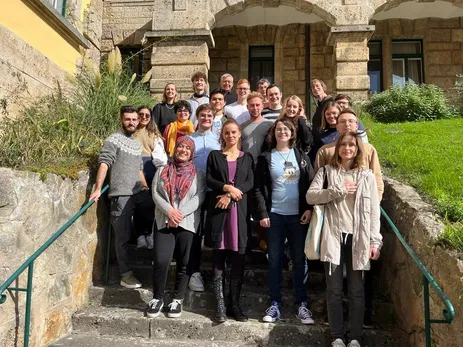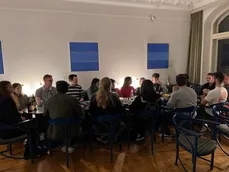Political science and mathematics - students in intercultural discourse
Studies |

Therefore, students of political science from the Julius Maximilian University of Würzburg and students of mathematics from the Technical University of Munich (TUM) set out for Rothenburg o.d.T.
What processes control the development of states?
The topic that the group of students are working on is the evolution of states and organizations. Especially in the current situation, in which the sovereignty and borders of European states are being questioned, it is all the more important to think about the deeper processes that control the development of modern state structures. Clearly, this is a core topic of political science. So what are the mathematicians doing here?
Mathematics is an essential tool in evolutionary theory - well established and accepted in the study of the emergence of complex biological systems, more experimental and still fairly new in the field of political science. Mathematics enables us to clearly formulate mechanisms, to translate ideas and hypotheses into quantitative models, and thus to translate theoretical considerations into testable predictions. For biology and evolutionary theory, this was a long road, but already Darwin understood that the path could be fruitful.
Different professional cultures: mathematics meets political science
![[Translate to en:] Studierende Evolution von Staaten Group of students in the seminar "Evolution of states and organizations".](/fileadmin/_processed_/6/e/csm_Seminar_Evolution_Staaten-2_dd4448ac14.webp)
The students started a similar expedition with the kick-off meeting at the Wildbad Conference Center in Rothenburg, sponsored by the political science faculty in Würzburg and the biomathematics group at TUM. It was the starting point of a project that will take place as a seminar in the winter term. The question: Can we jointly, from political science and mathematics, translate the tools of mathematical evolutionary theory into social science research tools?
First, the students of mathematics tried to become aware of their own discipline and scientific identity and to question what is quite self-evident:
- Is mathematics culturally dependent?
- If we have proven something, is it true?
- What philosophical foundations does mathematics actually have?
These are all interesting and important topics that we tend not to encounter in our lectures. On this basis, the mathematicians should engage with the specialist culture of their fellow students in political science and understand their working methods:
- How do sociologists gain knowledge?
- Do they only talk or do they also work?
- What is an institution?
How can we adapt rules so that systems - e.g. the joint use of public good - function in the long run?
From theory to practice

After the theory came the practice: direct discussions and a struggle to find common, interdisciplinary ground - not only whilst playing werewolf in the evening, but also during the day in joint teams. The teams have already succeeded in gathering first results and approaches. And it is working. Not just somehow, but amazingly well. The interdisciplinary teams came together effortlessly. The kick-off meeting of the seminar definitely whetted the appetite for more.
The Evolution of States and Organizations: We look forward to an exciting and controversial semester – full of curiosity for the other department, a lot of goodwill to build bridges, and also full of promise for scholarly returns. For those who are curious: We plan to make the results available so that everyone can participate in the experiment.
Matthias Gsänger (JMU Würzburg), Volker Hösel (TUM), Johannes Müller (TUM)